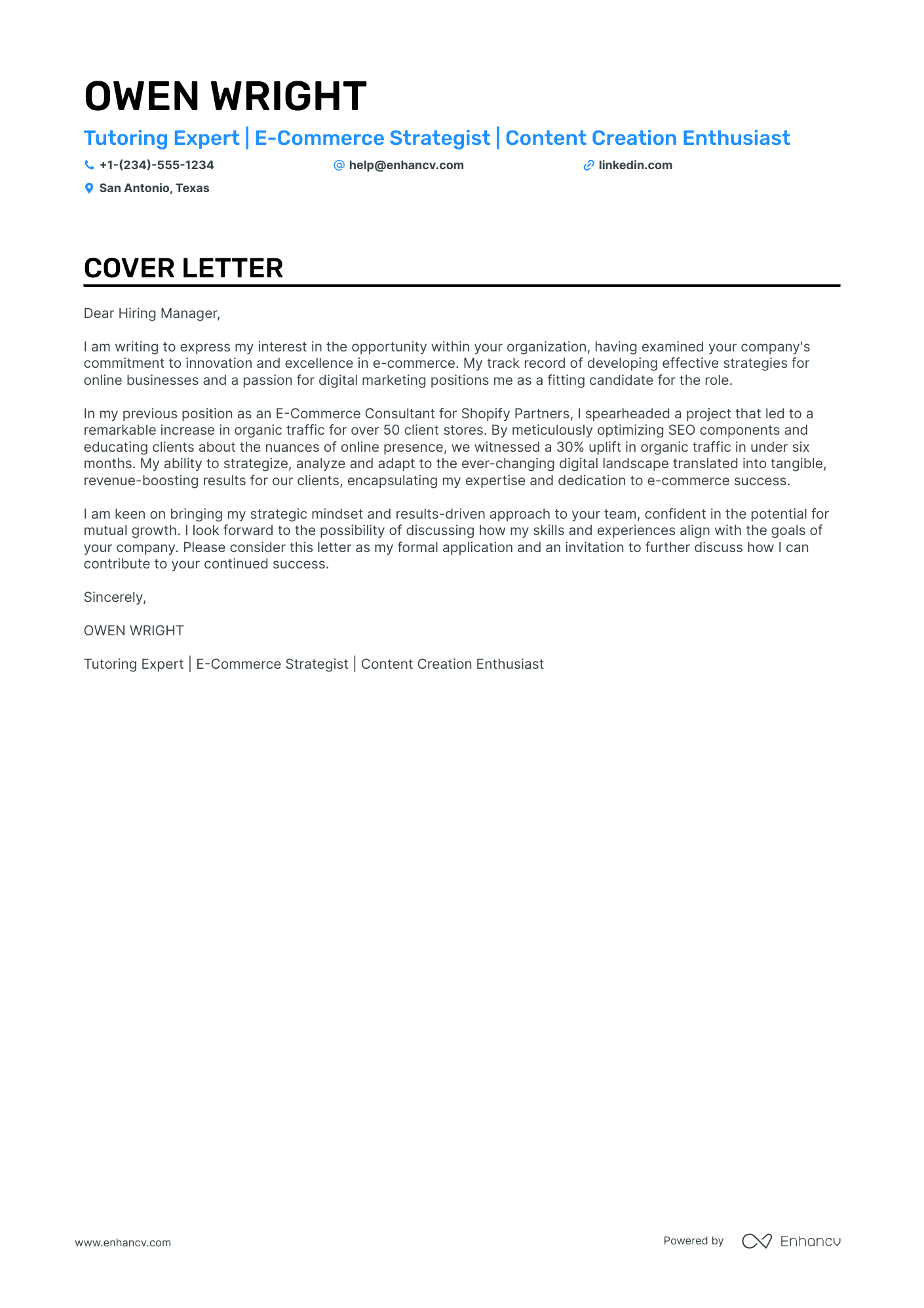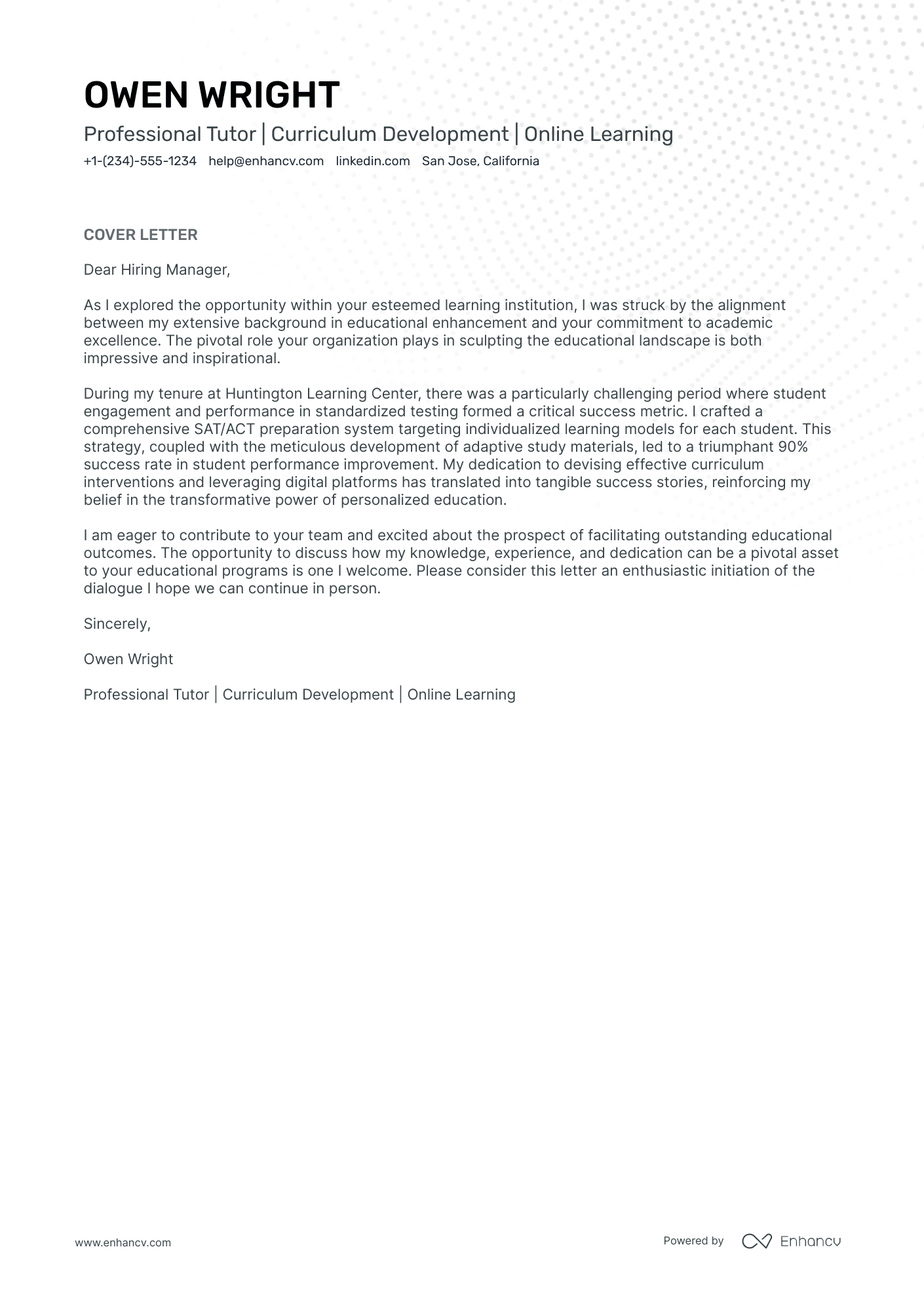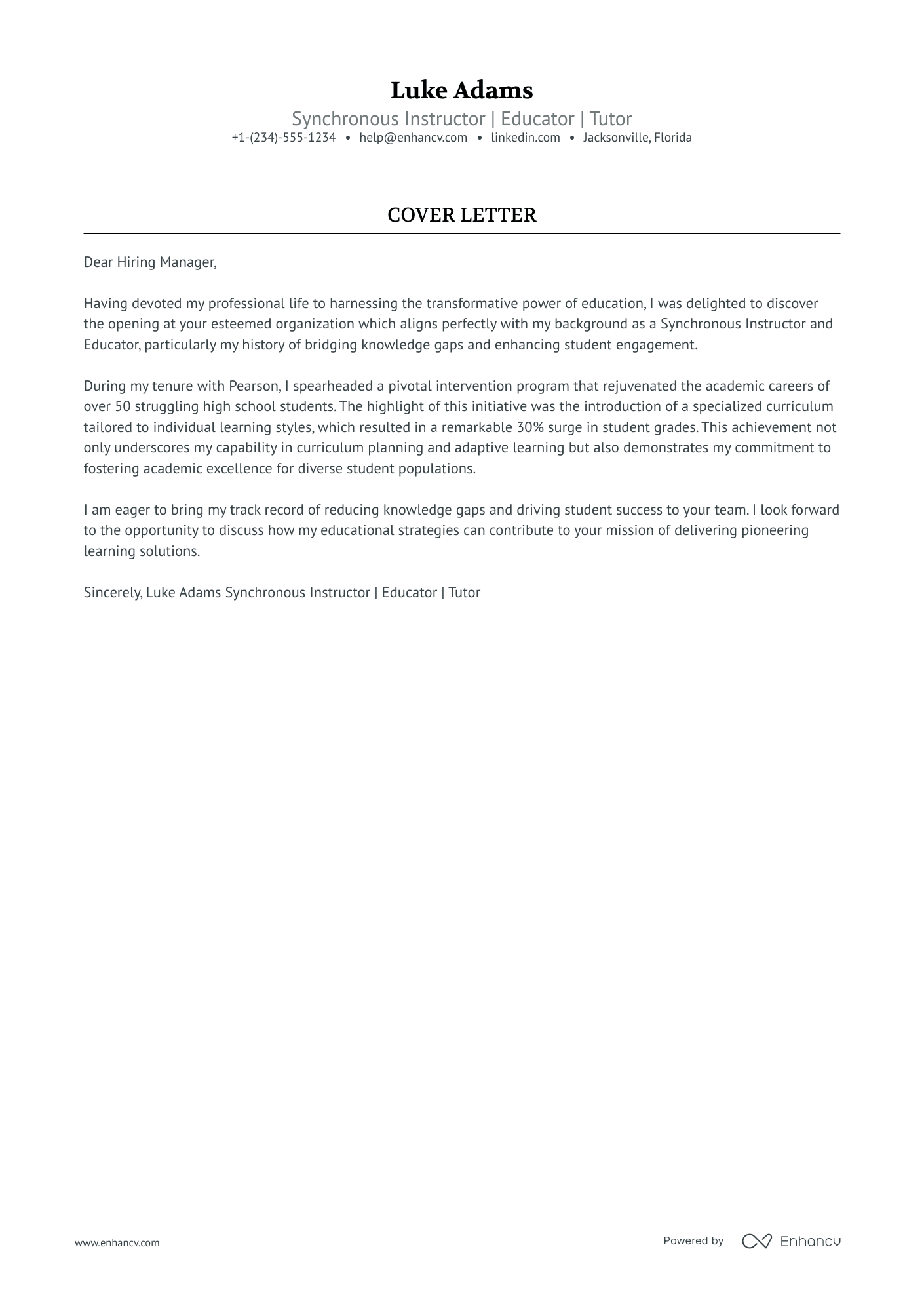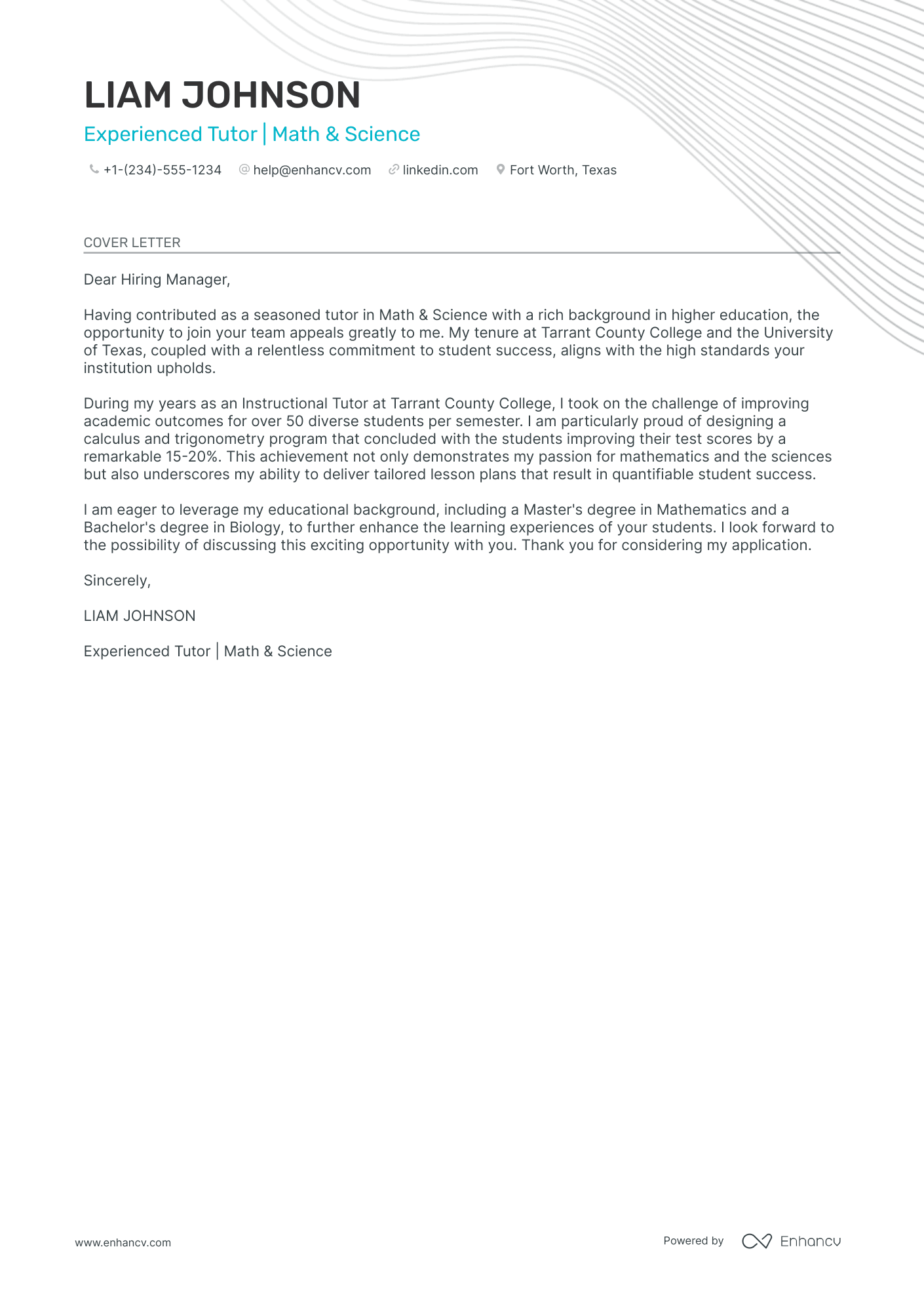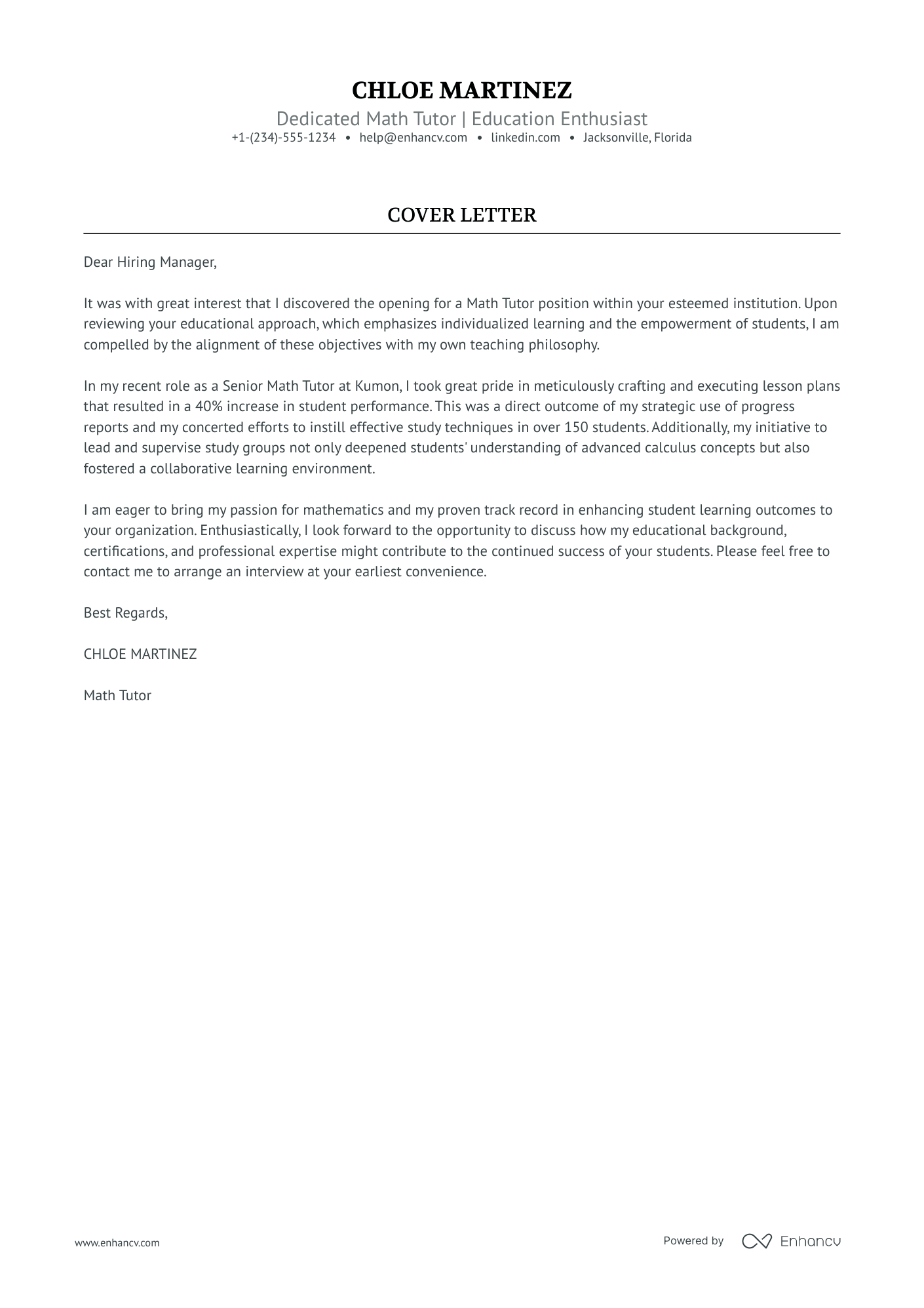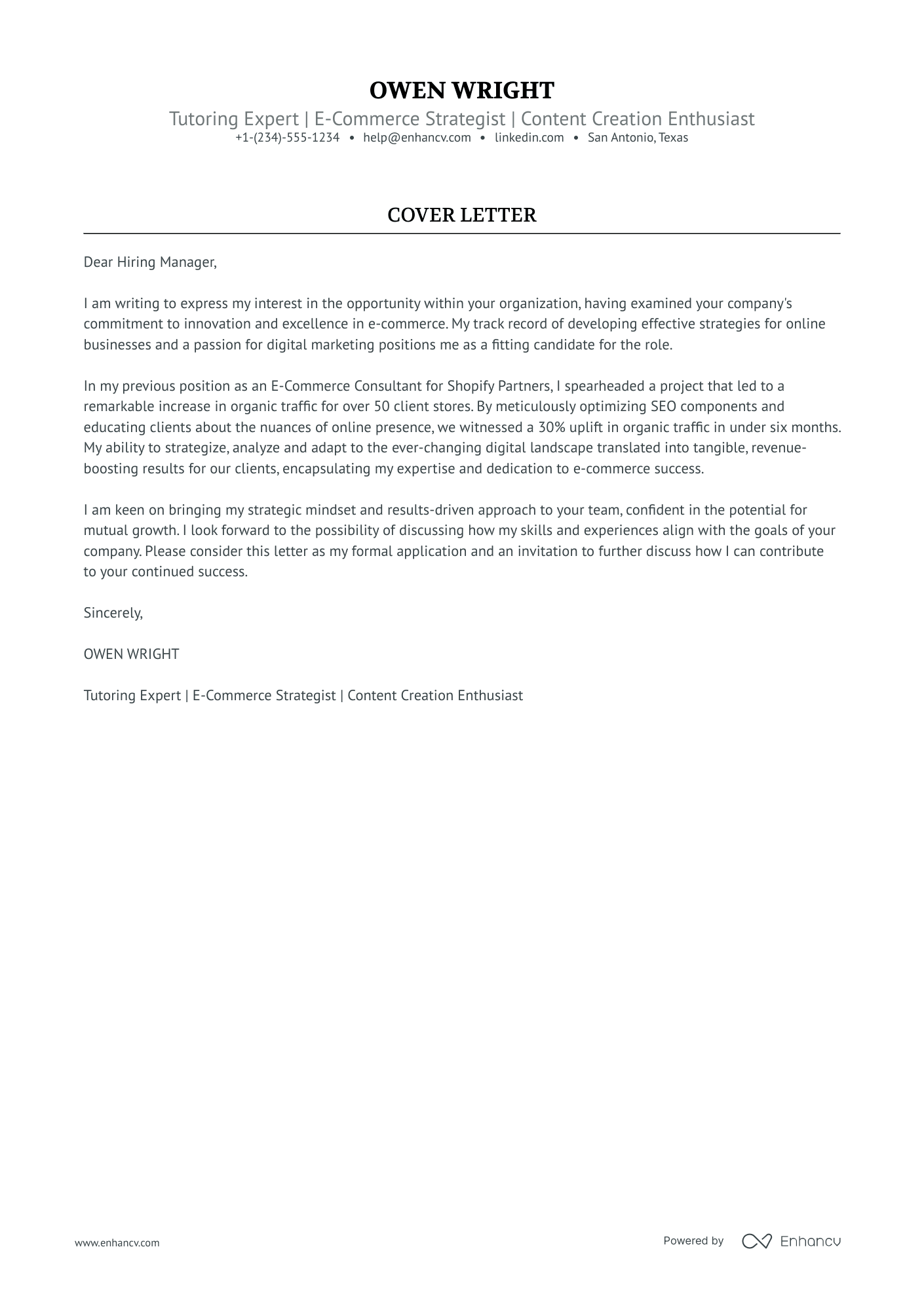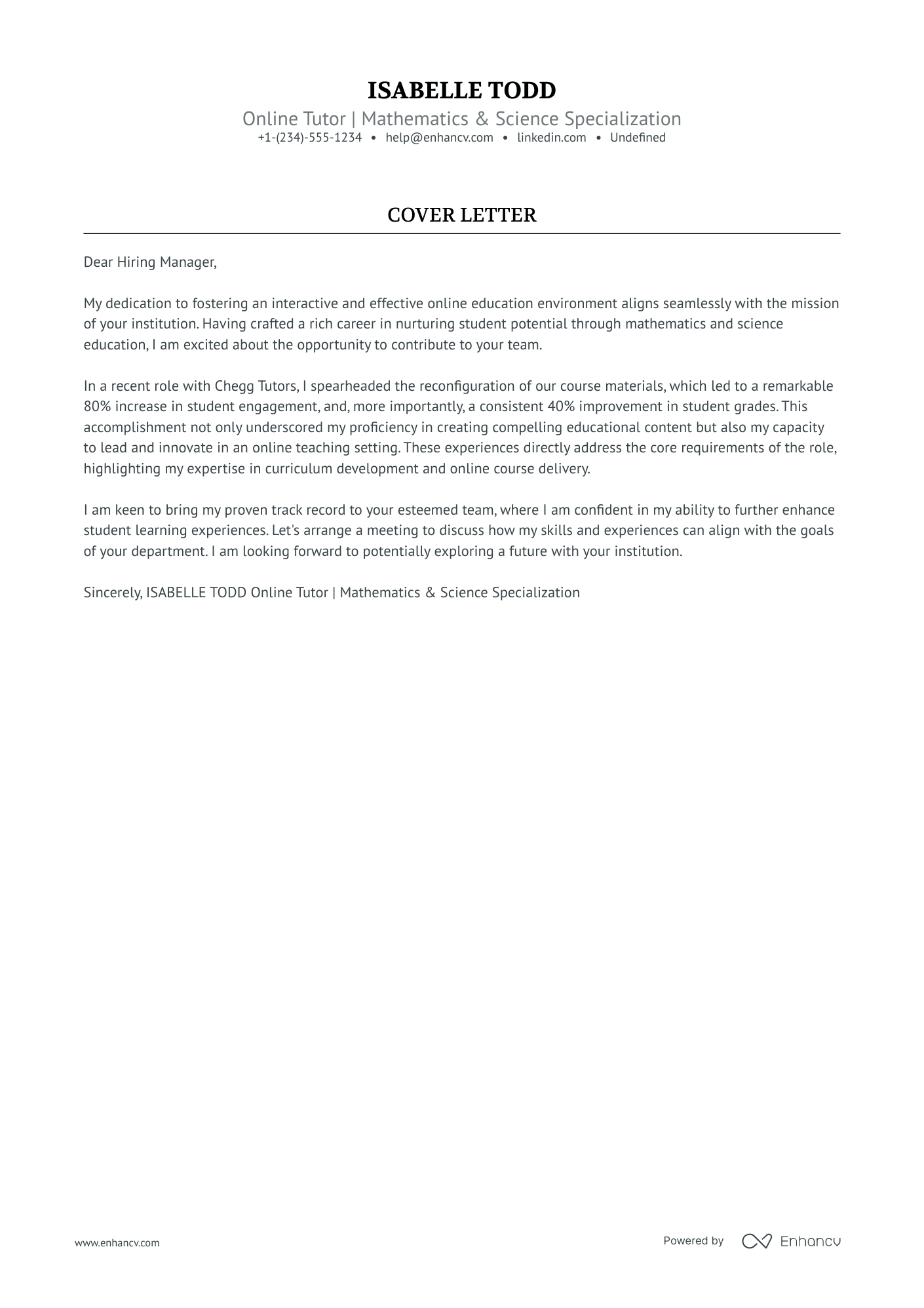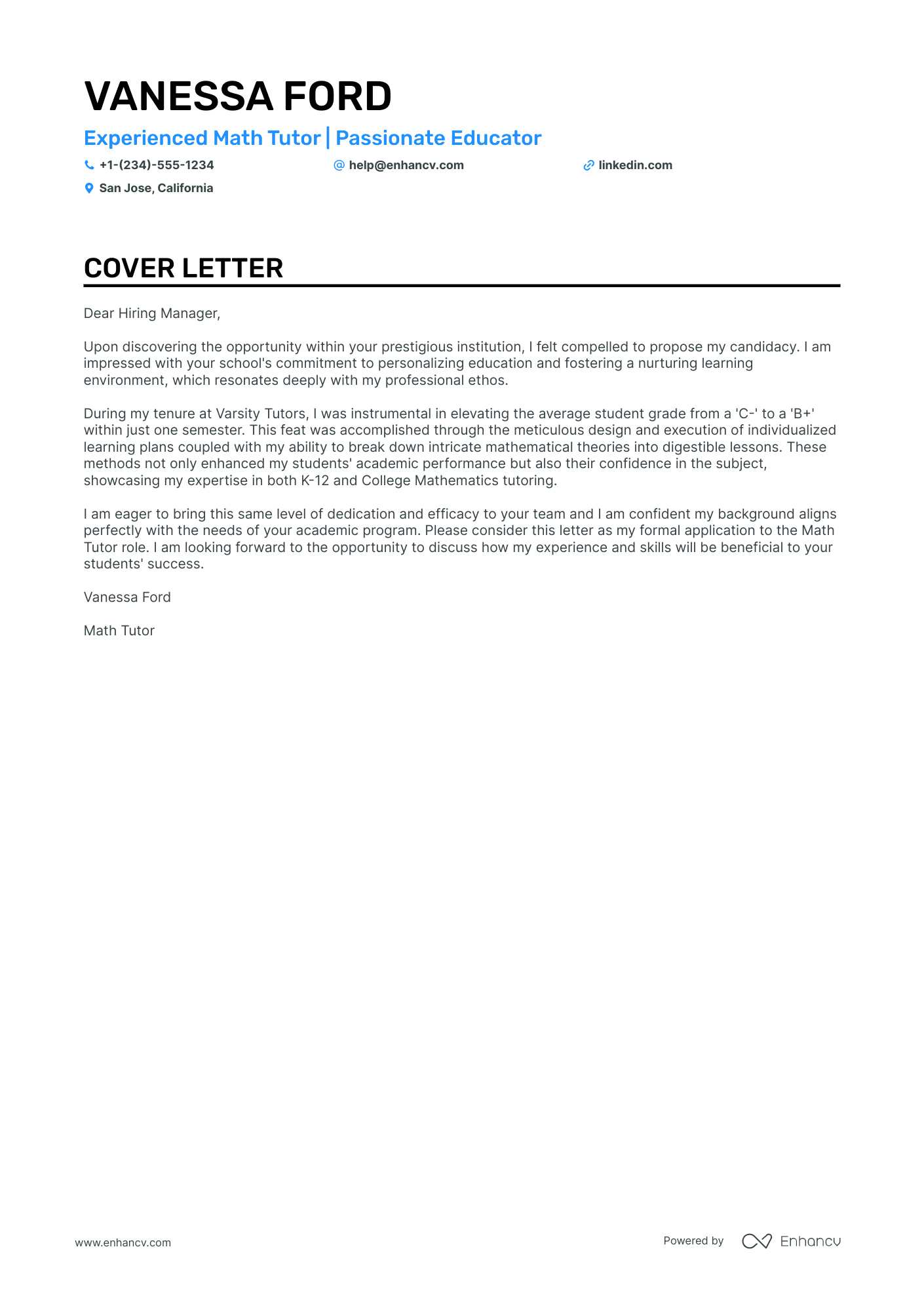Crafting a tutor cover letter can be a daunting task. You've likely started your job hunt, only to discover the pivotal role a cover letter plays in your application. It's your chance to share a powerful story of your proudest professional moment without just echoing your resume. You need to strike the perfect balance between formality and authenticity, steering clear of overused clichés, all while fitting your narrative neatly onto a single page. Let's begin.
- Personalize your tutor cover letter and get inspired by other professionals to tell a compelling story;
- Format and design your tutor cover letter to make an excellent first impression;
- Introduce your best achievement in your tutor cover letter to recruiters;
- How to make sure recruiters get in touch with you, using your tutor cover letter greeting and closing paragraphs.
What is more, did you know that Enhancv's AI can write your cover letter for you? Just upload your tutor resume and get ready to forward your job application in a flash.
If the tutor isn't exactly the one you're looking for we have a plethora of cover letter examples for jobs like this one:
- Tutor resume guide and example
- Virtual Teacher cover letter example
- Coaching cover letter example
- High School Science Teacher cover letter example
- High School Teacher cover letter example
- Lecturer cover letter example
- Paraprofessional cover letter example
- Teacher cover letter example
- Kindergarten Teacher Assistant cover letter example
- Retired Teacher cover letter example
- English Teacher cover letter example
Drop your resume here or choose a file.
PDF & DOCX only. Max 2MB file size.
Tutor cover letter example
AIDEN KELLY
Corona, CA
+1-(234)-555-1234
help@enhancv.com
- Highlighting Personal Success Stories - Illustrating a tangible impact on student outcomes, like in the example of the student who achieved a 93% in chemistry after tutoring, provides concrete evidence of the candidate's effectiveness.
- Relevant Experience with Diverse Student Populations - Mentioning experience in working with a diverse student body demonstrates the tutor's capability to address a wide range of learning styles and educational needs, which is crucial in a tutoring role.
- Proficiency in Educational Tools - Showcasing familiarity with tools such as MS Office and virtual teaching platforms reinforces the candidate's ability to deliver lessons effectively in a modern educational environment.
- Customized Teaching Strategies - Stating that personal tutoring strategies were employed highlights the candidate's adaptability and commitment to individualized student success, which is a key component of effective tutoring.
What should your tutor cover letter look like - formatting and organizing your information
Have you ever wondered what are the must-have sections you need to include in your tutor cover letter? Our builder sets those up for you with:
- Header - dedicated to your contact information, the role you're applying for, and the date (don't forget to include your name);
- Greeting and opening paragraph - to create a personalized and memorable experience for recruiters;
- Body paragraph - emphasizing your skill set and knowledge that aligns with the role and helps you to stand out;
- Closing paragraph - leaving a great impression and ending with an optional signature.
Use a cover letter template to discover the best formatting for your tutor cover letter: that is single-spaced paragraphs and wrapping your content in a one-inch margin.
Ensure that both your resume and tutor cover letter are in the same font. Stand apart from the crowd by using modern, yet simple fonts, like Chivo and Rubik, instead of the overused Arial and Times New Roman.
Did you know that the Applicant Tracker System (or ATS) won't be assessing your tutor cover letter? Instead, submit your profile in PDF to recruiters to keep the same formatting and the design intact.
Too busy to write your cover letter? Let our free cover letter generator handle it in just a few clicks.
The top sections on a tutor cover letter
Header: This should include your contact information, the date, and the employer's contact details, making it easy for the recruiter to know who you are and how to reach you.
Greeting: Address the letter to a specific person, such as the hiring manager or the principal, to personalize your application and show that you have researched the institution.
Introduction: Start with a strong opening statement that captures your enthusiasm for teaching and highlights your relevant experience or educational background to immediately engage the recruiter.
Body: This section should elaborate on your teaching philosophy, instructional strategies, subject area expertise, and any previous tutoring successes, demonstrating how your skills match the needs of the tutoring position.
Closing: Conclude with a proactive closing statement, reaffirming your interest in the position and expressing your availability to discuss your qualifications further in an interview, showing your eagerness to become a part of their educational team.
Key qualities recruiters search for in a candidate’s cover letter
- Subject matter expertise: Tutors must have a deep understanding of the material they teach to effectively help students grasp complex concepts.
- Patience and adaptability: Being patient helps in dealing with students of varying abilities and learning styles; adaptability allows tutors to change their teaching strategies as needed.
- Communication skills: The ability to convey information clearly and listen to student concerns is vital to ensure concepts are understood and to build a positive learning environment.
- Experience with diverse learning needs: Experience with students who have different learning challenges or disabilities is crucial to provide inclusive and accessible education.
- Results-oriented approach: A track record of helping students improve their grades or understanding of the subject matter is appealing, as it demonstrates the tutor's effectiveness.
- Interpersonal skills: Building rapport with students and parents is important for creating a supportive and motivating tutoring relationship.
How to start your tutor cover letter: with a greeting, of course
Have you ever considered just how powerful a personalized salutation can be?
We sure have news for you! Your tutor cover letter should start with the right salutation to recruiters, nurturing a sense of respect and individuality.
Greet recruiters by using their first name (e.g. "Dear Tom" or "Dear Patricia") if you've previously established contact with them.
Otherwise, opt out for the less familiar, "Dear Ms. Peaches" or "Dear Ms Kelsey", if you've found the recruiter's name on LinkedIn or a corporate website.
"To whom it may concern" is never a good option, as it creates a sense that you've been sending out your tutor cover letter to anyone. Instead, use "Dear HR team" or "Dear (company name) recruiter" for a feeling of exclusivity.
List of salutations you can use
- Dear Hiring Manager,
- Dear [Recipient's Name],
- Dear [School Name] Team,
- Dear [Department Name] Department,
- Dear Selection Committee,
- Dear [Title, if known] [Last Name],
Your tutor cover letter intro: showing your interest in the role
On to the actual content of your tutor cover letter and the introductory paragraph.
The intro should be no more than two sentences long and presents you in the best light possible.
Use your tutor cover letter introduction to prove exactly what interests you in the role or organization. Is it the:
- Company culture;
- Growth opportunities;
- Projects and awards the team worked on/won in the past year;
- Specific technologies the department uses.
When writing your tutor cover letter intro, be precise and sound enthusiastic about the role.
Your introduction should hint to recruiters that you're excited about the opportunity and that you possess an array of soft skills, e.g. motivation, determination, work ethic, etc.
What comes next: your tutor cover letter middle paragraphs
In the next three to six paragraphs (or the body of your tutor cover letter) you have to prove your unique value.
Most candidates tend to mess up at this stage. They tend to just copy-paste information from their resume.
That's one big no-no.
Remember that when writing your tutor cover letter, it has to be personalized. And, your ultimate aim is to catch the recruiter's eye.
So, look back on key job requirements and write down a list that includes the ones you cover.
Next, select just one key achievement from your professional (or personal) history that meets those advert keywords.
Narrate a story around how you've grown your skill set and knowledge. Also, aim to show the unique understanding or soft skills you bring about, thanks to your past success.
Closing paragraph basics: choose between a promise and a call to action
You've done all the hard work - congratulations! You've almost reached the end of your tutor cover letter.
But how do you ensure recruiters, who have read your application this far, remember you?
Most tutor professionals end their cover letter with a promise - hinting at their potential and what they plan on achieving if they're hired.
Another option would be to include a call for follow-up, where you remind recruiters that you're very interested in the opportunity (and look forward to hearing from them, soon).
Choose to close your tutor cover letter in the way that best fits your personality.
Addressing limited to no experience in the tutor cover letter
There's nothing to worry about if you lack professional experience.
Your tutor cover letter could bridge the gaps in your professional history by focusing on what matters most to recruiters, that's either:
- skills - focusing on transferable ones you've gained, thanks to your life experience (e.g. volunteering, certificates, etc.);
- achievements - select the most relevant and noteworthy one from your history (e.g. education, projects, etc.);
- motivation - describe how you envision your professional growth in the next up to five years, thanks to this opportunity.
Key takeaways
Summarizing the most important aspects in writing your tutor cover letter, remember to:
- Create a personalized tutor cover letter for each role you apply for, that includes the recruiter's name in the salutation;
- Format your tutor cover letter with single-spacing, one-inch margins, and a modern, yet ATS-friendly font;
- Always start off your tutor cover letter with two sentences that reflect what is most important about your application;
- Your tutor cover letter body should feature your biggest accomplishments and the job-relevant skills it has taught you;
- Instead of opting for the "Sincerely yours" ending, close your tutor cover letter with a nod to the future with what you aim to achieve in this potential role.
Tutor cover letter examples
By Role
